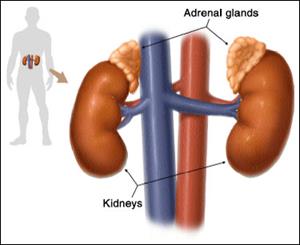 The adrenal glands help the body deal with stress and illness by producing the steroids, cortisol and aldosterone. When you have adrenal insufficiency (also called hypocortisolism), your adrenals cannot make enough of these steroids. This leads to altered electrolyte levels, mainly potassium and sodium. Many people with this disorder lose a lot of sodium in their urine and crave salty foods. One known condition is Addison's disease, which is a congenital form of adrenal hyperplasia and insufficiency.
The adrenal glands help the body deal with stress and illness by producing the steroids, cortisol and aldosterone. When you have adrenal insufficiency (also called hypocortisolism), your adrenals cannot make enough of these steroids. This leads to altered electrolyte levels, mainly potassium and sodium. Many people with this disorder lose a lot of sodium in their urine and crave salty foods. One known condition is Addison's disease, which is a congenital form of adrenal hyperplasia and insufficiency.
What Causes It?
The adrenal glands are two tiny endocrine organs on the top of the kidneys. When they don't release enough hormones, it results in insufficiency. Causes vary depending on the type, either primary or secondary.
Primary Adrenal Insufficiency
Also known as Addison's disease, the adrenal glands are unable to produce adequate amounts of cortisol. There may also be low levels of aldosterone. There are approximately 110 to 144 people out of 1 million with Addison’s disease.
Secondary Adrenal Insufficiency
This form is not actually caused by malfunctioning adrenal glands. The cause is actually in the pituitary gland. The pituitary gland lies at the base of the brain and produces adrenocorticotropin (ACTH). ACTH triggers the adrenal glands to make and release cortisol. If the adrenal glands are not stimulated, they begin to shrink.
Secondary insufficiency is actually more common than primary.
What Are the Symptoms of Adrenal Insufficiency?
The symptoms aren’t very specific in the early stages and often ignored. Symptoms include:
- Fatigue (chronic and long-term)
- Abdominal pain
- Weight loss
- Lack of appetite
- Weakness
- Diarrhea
- Vomiting
- Nausea
- Drop in blood pressure, especially when standing
- Irritable moods
- Depression
- Salt cravings
- Low-blood sugar
- Sweating
- Headache
- Lack of menstrual periods
- Low libido
- Darkening of skin pigment (Addison's only)
If you have any of the above symptoms, see your doctor. They will perform a thorough physical and have your blood levels of cortisol checked. There is also imaging tests of the pituitary and adrenal glands to look for any irregularities.
How Is It Treated?
Note: An adrenal crisis is a medical emergency. If you or someone you know has adrenal insufficiency and has nausea, vomiting, and weakness, get to a hospital right away. An adrenal crisis can be fatal if not treated. The treatment for an adrenal crisis is a cortisol injection right away. People with known Addison's disease may have an injection pen on them for use in emergencies.
- If the insufficiency is caught early before a crisis, doctors will prescribe the missing hormones to be taken every day. During the beginning of treatment, the doctor will adjust the doses of hormones until you are stable.
- If you are missing cortisol, you will be given hydrocortisone, dexamethasone, or prednisone. You will need to take your steroid medications between 1 to 3 times daily and know when to increase your doses during periods of illness or stress.
- If you are missing aldosterone, they will prescribe fludrocortisone that is taken 1 to 2 times daily. This medication usually isn't needed in people with secondary adrenal insufficiency.
- They can also replace the androgen, dehydroepiandrosterone which can help improve libido in women with hypocortisolism.
- If you do have an adrenal crisis you will most likely need to be stabilized in the hospital. If you are found to have low blood sugar, low sodium and low blood pressure with high potassium then you will need intravenous corticosteroids, intravenous saline, and dextrose until you are better. The doctor will then start you on oral medications and attempt to stabilize you on oral medications before you go home. They may also tell you to increase your sodium intake through diet.
- There is new research that DHEA may help secondary adrenal insufficiency in adolescent girls. They are still researching this and have not yet made any recommendations on how much supplementation is effective.
- It is important to be careful with alternative medicine and natural therapies. If they are still under investigation and not approved by the Food and Drug Administration (FDA) they could be dangerous to your health. Experts agree that some of the over-the-counter supplements marketed for adrenal insufficiency may be dangerous, because they contain powdered adrenal glands.
The best way to complement your doctor’s recommended treatment is to make healthy lifestyle changes that support healthy adrenal gland function. These lifestyle changes include:
- Eat healthy. Eat smaller meals often. Skipping meals can trigger blood sugar drops and stress the adrenal glands. Include plenty of fresh fruit, fresh vegetables, lean proteins, and complex carbohydrates. Try to stay away from process foods, junk food, and fast food.
- Get plenty of rest. If your body gets overtired, your adrenals need to produce extra hormones to make up for needed energy. Make sure you get enough sleep at night and rest during the day if you feel tired.
- Get exercise. Getting exercise can help your body deal with stress better.
Prognosis for Adrenal Insufficiency
If you follow your doctor’s recommendation for treatment, the prognosis is very good. If Addison’s disease is left untreated, the outcome could be fatal. One complication to look out for is that intestinal perforation or sepsis can occur if the body has too high a cortisol level.
In adrenal crisis, death can occur from low blood pressure or arrhythmia due to the potassium levels being too high. Immediate steroid hormone replacement is needed in an emergency room setting.
